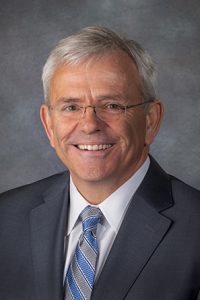Omnibus criminal justice reform bill approved
The Legislature approved a bill May 24 that makes several changes to current criminal justice statutes.

LB686, as introduced by Omaha Sen. Steve Lathrop, would have imposed new requirements on the Nebraska Department of Correctional Services for declaring a prison overcrowding emergency. The bill was replaced with provisions of several additional bills.
Among these is LB91, sponsored by Omaha Sen. Justin Wayne, which allows a court to enter a deferred judgement for a person found guilty of committing a crime. Persons granted a deferred judgment instead can be placed on probation. After successful completion of the terms of probation, he or she will have their charge dismissed without the entry of judgment.
A defendant will not be eligible for deferred judgement if he or she has a previous felony conviction, has received two or more deferred judgments, has received a deferred judgment in the past five years or is ineligible for probation.
Provisions of Wayne’s LB233 also are included in the bill. These prohibit a person from bringing an electronic communication device into a correctional facility or providing it to an inmate. Violation of this provision will be a Class I misdemeanor, punishable by up to one year in prison, a $1,000 fine or both.
Attorneys, public counsel employees, law enforcement and first responders are exempt from the prohibition. The NDCS director also can exempt certain staff members as necessary. Seizure of an electronic communication device is authorized.
The measure also includes provisions of LB739, sponsored by Omaha Sen. Tony Vargas, which prohibit NDCS, after March 1, 2020, from placing a member of a vulnerable population in restrictive housing. Vulnerable populations include inmates who are younger than 18, pregnant or diagnosed with serious mental illness, developmental disabilities or traumatic brain injury.
The bill does not prevent NDCS from establishing secure mental health housing or placing vulnerable inmates in temporary segregation pending classification.
Finally, LB686 incorporates provisions of four additional bills, including:
• LB90, sponsored by Wayne, which removes a requirement for post-release supervision for Class IV felonies;
• LB240, sponsored by Lincoln Sen. Matt Hansen, which allows a private contract facility to provide treatment to criminal defendants found to be mentally incompetent to stand trial;
• LB262, sponsored by Bennington Sen. Wendy DeBoer, which requires the NDCS director to share the annual restrictive housing report with members of the long-term restrictive housing work group prior to release of the report; and
• LB684, sponsored by Lathrop, which allows judges to sentence a person found to have violated terms of post-release supervision to a period of incarceration equal to the length of his or her original term of post-release supervision.
The bill was passed on a 46-0 vote.

